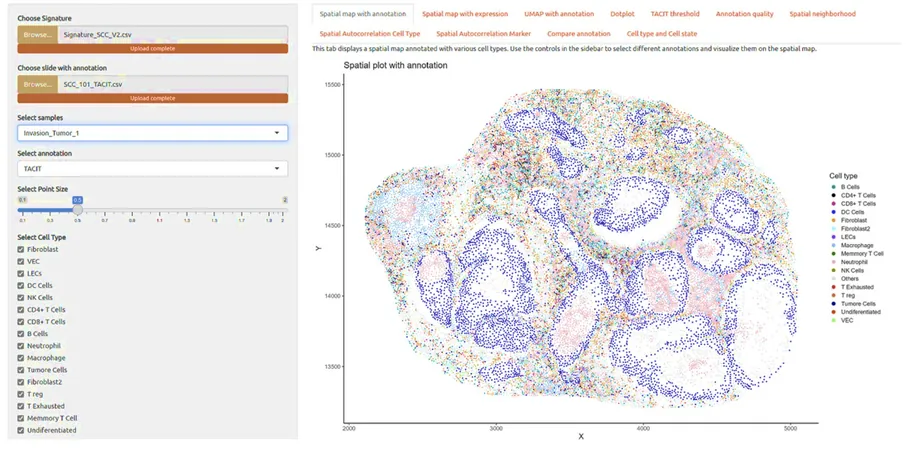
Revolutionary Algorithm Slashes Cancer Cell Identification Time to Minutes!
2025-06-16
Author: Siti
The Future of Cancer Treatment is Here!
Breakthrough research from the VCU Massey Comprehensive Cancer Center is set to transform cancer treatment. Scientists have unveiled an innovative algorithm that identifies cell types in mere minutes, a task that traditionally took more than a month. This game-changing development could drastically improve how patients are matched with effective therapies.
Meet TACIT: The Game-Changer for Cancer Research
Dubbed TACIT (Threshold-based Assignment of Cell Types from Multiplexed Imaging Data), this cutting-edge tool was crafted by Dr. Jinze Liu and Dr. Kevin Byrd. TACIT harnesses data from over 5 million cells spanning vital body systems—including the brain, gut, and oral glands—enabling it to classify cells with unmatched accuracy and scalability.
Dr. Liu points out that, "We're using artificial intelligence to increase efficiency and accuracy in diagnosis. As we accumulate more data, the potential for TACIT to improve patient outcomes will grow exponentially." This promises quicker diagnoses, reduced unnecessary treatments, and better matches for clinical trials.
Proven Performance: TACIT Outshines Traditional Methods
In a recent publication, TACIT proved its superiority against three existing unsupervised methods, showcasing remarkable accuracy and integration of various cell types and states. This means heightened reliability in results—crucial for doctors aiming to understand what’s truly happening within the body.
Wider Applications: From Clinical Trials to Pharmacology
The potential applications for TACIT are extensive. Dr. Liu reveals a key goal: to identify effective spatial biomarkers that predict patient responses to clinical trials even before enrollment. Dr. Byrd adds, "You can ensure the right patients enter trials—preventing the wrong patients from being subjected to ineffective treatments." This critical aspect could redefine clinical trials.
Furthermore, TACIT extends its benefits into pharmacology, using RNA markers to enhance patient care. Dr. Byrd emphasizes the importance of guiding patients towards FDA-approved drugs, potentially sidestepping the need for experimental therapies that might offer little benefit.
Cross-Disciplinary Innovation: The Rosetta Stone of Biology
Liu and Byrd describe TACIT as a 'Rosetta Stone' for biological data, allowing diverse data types to converge into a unified language. This opens countless doors for future research across different diseases, organ systems, and protein studies.
Their pioneering work also bridges slide proteomics with transfer proteomics, paving the way for advanced cell multi-omics studies. No longer limited to single-cell omics, researchers can now examine multiple markers simultaneously, revolutionizing the field of cancer research.
Conclusion: A New Era for Cancer Patients
This groundbreaking algorithm signifies hope for cancer patients everywhere. With rapid identification of cell types leading to tailored treatments, the future of oncology is poised for transformation. Stay tuned as TACIT continues to evolve, promising to reshape the landscape of cancer therapies!



 Brasil (PT)
Brasil (PT)
 Canada (EN)
Canada (EN)
 Chile (ES)
Chile (ES)
 Česko (CS)
Česko (CS)
 대한민국 (KO)
대한민국 (KO)
 España (ES)
España (ES)
 France (FR)
France (FR)
 Hong Kong (EN)
Hong Kong (EN)
 Italia (IT)
Italia (IT)
 日本 (JA)
日本 (JA)
 Magyarország (HU)
Magyarország (HU)
 Norge (NO)
Norge (NO)
 Polska (PL)
Polska (PL)
 Schweiz (DE)
Schweiz (DE)
 Singapore (EN)
Singapore (EN)
 Sverige (SV)
Sverige (SV)
 Suomi (FI)
Suomi (FI)
 Türkiye (TR)
Türkiye (TR)
 الإمارات العربية المتحدة (AR)
الإمارات العربية المتحدة (AR)